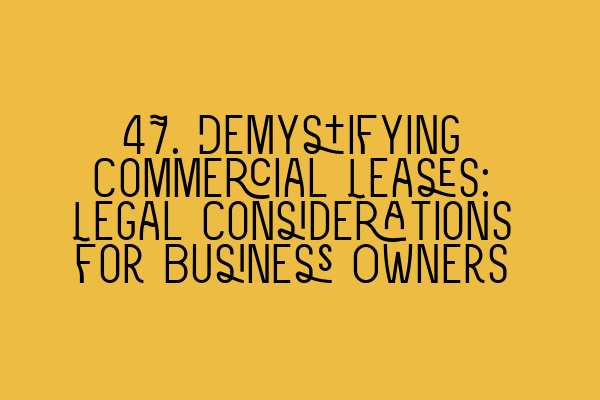Demystifying Commercial Leases: Legal Considerations for Business Owners
As a business owner, one of the most important decisions you will make is choosing the right location for your operations. And with that decision comes the need to enter into a commercial lease agreement. Commercial leases can be complex and confusing, but understanding the legal considerations involved is essential to protect your rights and interests.
1. Lease Term and Renewal
The lease term refers to the duration of the agreement. It is important to carefully consider the length of the lease term, taking into account your business needs, growth projections, and market conditions. Additionally, understanding the options for renewal and the process involved is crucial for long-term planning and stability.
2. Rent and Expenses
The rent and expenses associated with the lease are key factors to consider. It is important to understand the rent payment terms, including any escalations over the lease term. Additionally, you should carefully review any additional expenses, such as property taxes, maintenance costs, and insurance, to ensure they are clearly outlined and fair.
3. Use and Restrictions
The permitted use of the leased premises should be clearly stated in the lease agreement. Understanding any restrictions on the use of the property is essential to avoid potential conflicts or violations. It is also important to consider any provisions regarding alterations, signage, and subletting.
SQE 1 Practice Mocks FLK1 FLK2
4. Repairs and Maintenance
The lease agreement should clearly outline the responsibilities for repairs and maintenance of the premises. Understanding your obligations and those of the landlord is important to ensure the property remains in good condition and to avoid any disputes.
5. Assignment and Subletting
In some cases, you may need to assign the lease or sublet the premises to another party. Understanding the process involved, any restrictions, and the landlord’s approval requirements is crucial to protect your interests and maintain control over the property.
6. Termination and Dispute Resolution
It is important to carefully review the termination provisions in the lease agreement. Understanding the circumstances under which the lease can be terminated, the notice period required, and any potential penalties or liabilities is crucial. Additionally, consider the dispute resolution mechanisms in place, such as mediation or arbitration, to ensure a fair and efficient resolution in case of any conflicts.
7. Legal Advice and Due Diligence
Commercial leases are legally binding contracts, and seeking legal advice is strongly recommended. An experienced solicitor can help you navigate the complexities of the lease agreement, review the terms, negotiate on your behalf, and ensure that your rights and interests are protected throughout the process.
In conclusion, entering into a commercial lease requires careful consideration of various legal aspects. By understanding the lease term and renewal options, rent and expenses, use and restrictions, repairs and maintenance, assignment and subletting, termination and dispute resolution, and the importance of seeking legal advice, business owners can ensure a smooth and successful leasing experience.
For more information about the SQE exams and preparation, visit SRA SQE Exam Dates.
